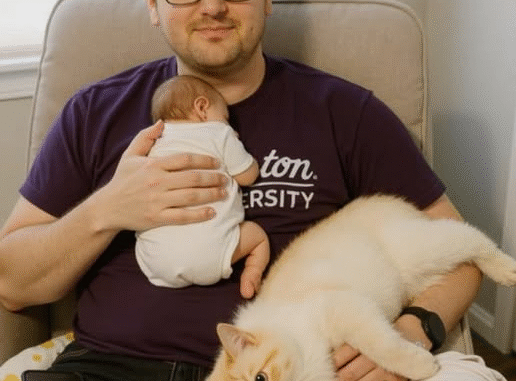
I thought I understood silence, not as an absence of sound, but as a heavy presence. This was the kind of silence that I learned from my brother, Keane, who was diagnosed with au.tism when he was young. Living with him taught me to notice the small things—the careful way he organized his pencils, the slight clench of his jaw when a noise was too loud. Our house became a place of careful quiet, and I learned to make myself small and not be in the way. Keane was gentle and distant, and though he rarely spoke, I told myself I understood him anyway, believing that words weren’t everything.
As time passed, I grew up, my parents passed away, and Keane was moved to a state facility. When I became pregnant, I visited him and asked if he wanted to come live with me and my husband, Will. He gave a small, hesitant nod, and we brought him home, creating a safe space for him six months before my due date. When our son, Owen, was born, he brought with him a loud, chaotic energy. My life became a series of exhausted routines, while Keane stayed in his corner of the living room, quietly humming to himself, a sound that at first scraped my nerves but eventually became a part of the house.
A New Chapter
Our lives continued on this quiet, separate path until a chaotic Tuesday when Owen wouldn’t stop crying. Exhausted and at my wit’s end, I ran to the bathroom, only to hear him screaming moments later. I rushed to the living room, bracing myself for a tantrum, but instead, I found the house was quiet. My brother, who had never sat in my chair before, was sitting there with Owen sleeping peacefully on his chest. Keane’s hands moved gently up and down the baby’s back, and our cat, Mango, was purring on his lap.
Keane looked at me, and in a voice that was barely a whisper, he said, “He likes the hum.”
The words hit me like a door suddenly swinging open. My brother, who hadn’t spoken a full sentence in years, had just spoken a simple, clear, and profound truth. He explained that Owen liked the humming sound, just like the app he used. That was the moment everything changed. I didn’t make a big deal of it, but inside, I was filled with a mix of awe and relief. I began to trust him with the baby, and in return, Keane started saying more—not stories, but small, factual sentences that wove themselves into our daily lives.
Learning to Listen
As he spoke more, I realized how much I had missed. I had mistaken his silence for a full stop, thinking there was nothing more to learn. I now saw that true listening was active—a mix of attention, curiosity, and humility. My old guilt had sharp edges, but it was being replaced by a new understanding. One night, after I mistakenly woke Owen, Keane’s fear of having “messed up” led him to whisper, “I messed up,” over and over. I held him and Owen, and told him that everyone makes mistakes, and that he was not broken. It was a moment of healing and open, honest tears.
In the months that followed, our family shifted. Keane began volunteering at a sensory play center. Owen’s first word wasn’t “Mama” or “Dada,” but “Keen.” Our days were filled with small, steady rituals, like pancake mornings and a bedtime routine with Keane humming a lullaby. We made space for Keane to be a person, not a puzzle. We learned that love isn’t about fixing someone, but about truly seeing them.
In the end, I learned that silence isn’t empty—it’s full of decisions, effort, and hope. A small, true sentence can light a path you didn’t see before, and a whisper can be a lantern.